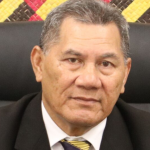Politics
Tuvalu Politics
This page explores Tuvalu’s political structure incorporating real-time RSS feed news and videos. By harnessing the power of RSS feeds, visitors can stay informed about the latest developments in Tuvalu’s politics as they happen. The dynamic nature of these feeds ensures that users receive up-to-the-minute updates on political events, policy changes, and significant milestones, enabling them to stay abreast of the ever-evolving political scene.

Kausea Natano
13th Prime Minister of Tuvalu
Incumbent
Assumed office
19 September 2019
Image credit
The politics of Tuvalu takes place in a framework of a parliamentary representative democratic monarchy, whereby the Monarch is the head of state, represented by the Governor-General, while the Prime Minister is the head of government. Executive power is exercised by the government. The Constitution of Tuvalu states that it is “the supreme law of Tuvalu” and that “all other laws shall be interpreted and applied subject to this Constitution”; it sets out the Principles of the Bill of Rights and the Protection of the Fundamental Rights and Freedoms. In 1986 the Constitution adopted upon independence was amended in order to give attention to Tuvaluan custom and tradition as well as the aspirations and values of the Tuvaluan people. The changes placed greater emphasis on Tuvaluan community values rather than Western concepts of individual freedom. Tuvalu follows the Westminster system of representative democracy although Tuvalu is a non-partisan democracy and elections in Tuvalu take place without reference to formal political parties. At the date of independence there were 12 members of the Parliament of Tuvalu. Amendments to the Electoral Provisions (Parliament) Act in 1999 & 2000 increased the membership of parliament to 15 MPs. The Electoral Provisions (Parliament) Amendment Act 2019 increased the number of elected representatives for the electorate of Nukulaelae to become 2 MPs. So that each of the 8 island electorates is represented by 2 MPs, with Niulakita being represented by the MPs from Niutao.
Tuvaluans participated in the political institutions of the Gilbert and Ellice Islands Colony during the transition to self-determination. A referendum was held in December 1974 to determine whether the Gilbert Islands and Ellice Islands should each have their own administration. As a consequence of the referendum the Gilbert and Ellice Islands colony ceased to exist on 1 January 1976 and the separate British colonies of Kiribati and Tuvalu came into existence. In 2008 Tuvaluans rejected a constitutional referendum that proposed replacing the Queen of Tuvalu, with an elected president as the head of state.
Unless other sources are listed, original content is provided by ChatGPT. ChatGPT may produce inaccurate information about people, places, or facts. #Tuvalu #TuvaluPolitics #TuvaluNews #TuvaluNewsToday #TuvaluRSSFeed #BlahFace



